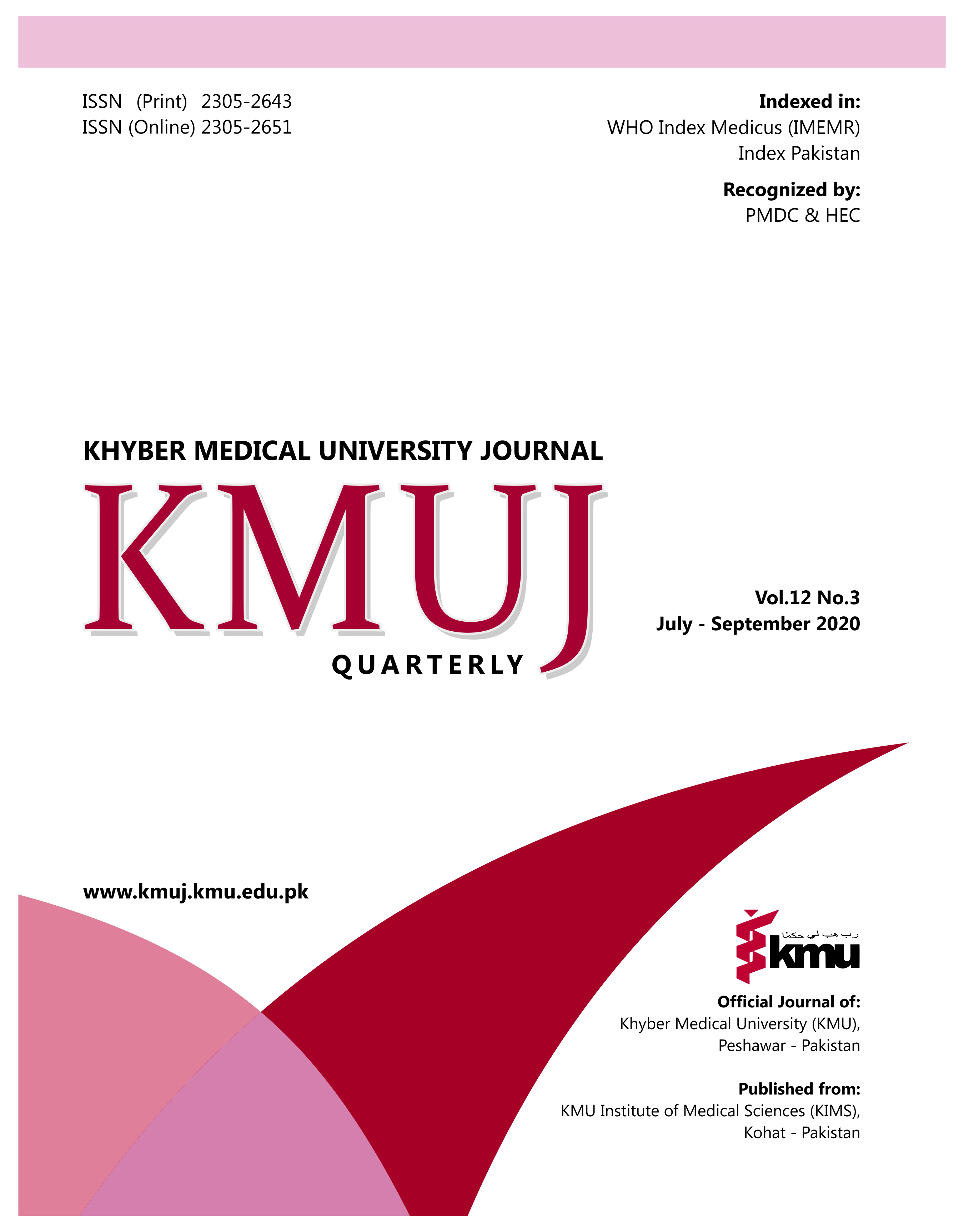DOPING KNOWLEDGE, BELIEFS AND PRACTICES AMONG PHYSIOTHERAPISTS
Main Article Content
Abstract
OBJECTIVE: To study the knowledge, beliefs, and practices of doping in sports among physiotherapists.
METHODS: This cross-sectional study was conducted among 390 physiotherapists working in different hospitals/clinics and teaching universities of Lahore with response rate of 94.61% (n=369). Modified Doping Use Belief tool was used to assess beliefs on use of performance enhancement drugs, other questions were used to check doping knowledge and practice of these drugs. SPSS v22.0 was used to analyze the data.
RESULTS: Out of 369 respondents, 272 (73.7%) were females and 97 (26.3%) were males. Mean age was 27±4.4 years. In general knowledge about doping, 196 (53.1%) never studied sports course, 238 (64.5%) had no information about doping, 204 (55.3%) were not aware of banned substances, and 312 (84.6%) had information through media. Specifically about doping, 240 (65%), 174 (47.3%), 250 (67.7%), 238 (64.5%), and 229 (62.1%) had no knowledge about prohibited list, therapeutic use exemptions, procedures of anti-doping testing, anti-doping rule violation, and sanctions on anti-doping rule violations respectively. Majority (n=238; 64.5%) had some extent of knowledge about health risks related to doping. In beliefs, 281 (76.2%) and 259 (70.2%) had a disagreement on belief that performance-enhancing drugs/methods should be allowed for top-level athletes and all athletes respectively. In practice, 347 (94%) never offered any doping agent and 314 (85.1%) never had any experience with doping drugs.
CONCLUSION: Physiotherapists had a low knowledge on doping. Majority of respondents showed positive belief of non-use of doping agents, and in practice majority had never practiced doping drugs.
Article Details
Work published in KMUJ is licensed under a
Creative Commons Attribution 4.0 License
Authors are permitted and encouraged to post their work online (e.g., in institutional repositories or on their website) prior to and during the submission process, as it can lead to productive exchanges, as well as earlier and greater citation of published work.
(e.g., in institutional repositories or on their website) prior to and during the submission process, as it can lead to productive exchanges, as well as earlier and greater citation of published work.
References
Kim T, Kim YH. Korean national athletes' knowledge, practices, and attitudes of doping: a cross-sectional study. Subst Abuse Treat Prev Policy 2017;12:7. DOI 10.1186/s13011-017-0092-7.
Manouchehr J, Tojari F. Development and validation of instruments to measure doping attitudes and doping beliefs. Euro J Exp Bio 2013;3(2):183-6.
Bae M, Yoon J, Kang H, Kim T. Influences of perfectionism and motivational climate on attitudes towards doping among Korean national athletes: A cross sectional study. Subst Abuse Treat Prev Policy 2017;12:52. DOI: 10.1186/s13011-017-0138-x.
Murofushi Y, Kawata Y, Kamimura A, Hirosawa M, Shibata N. Impact of anti-doping education and doping control experience on anti-doping knowledge in Japanese university athletes: a cross-sectional study. Subst Abuse Treat Prev Policy 2018;13(1):44. DOI: 10.1186/s13011-018-0178-x.
Muwonge H, Zavuga R, Kabenge PA, Makubuya T. Nutritional supplement practices of professional Ugandan athletes: a cross-sectional study. J Int Soc Sports Nutr 2017;14:41. DOI: 10.1186/s12970-017-0198-3.
Morente-Sanchez J, Zabala M. Doping in sport: a review of elite athletes' attitudes, beliefs, and knowledge. Sports Med 2013;43(6):395-411. DOI: 10.1007/s40279-013-0037-x.
Constant NL, Tshisikhawe MP. Hierarchies of knowledge: ethnobotanical knowledge, practices and beliefs of the Vhavenda in South Africa for biodiversity conservation. J Ethnobiol Ethnomed 2018;14(1):56. DOI: 10.1186/s13002-018-0255-2.
Ntoumanis N, Ng JY, Barkoukis V, Backhouse S. Personal and psychosocial predictors of doping use in physical activity settings: a meta-analysis. Sports Med 2014;44(11):1603-24. DOI: 10.1007/s40279-014-0240-4.
Overbye M, Wagner U. Between medical treatment and performance enhancement: an investigation of how elite athletes experience Therapeutic Use Exemptions. Int J Drug Policy 2013;24(6):579-88. DOI: 10.1016/j.drugpo.2013.03.007.
Garthe I, Maughan RJ. Athletes and Supplements: Prevalence and Perspectives. Int J Sport Nutr Exe. 2018;28(2):126-38. DOI: 10.1123/ijsnem.2017-0429.
Tandon S, Bowers LD, Fedoruk MN. Treating the elite athlete: anti-doping information for the health professional. Mo Med 2015;112(2):122-8.
Allen JB, Morris R, Dimeo P, Robinson L. Precipitating or prohibiting factor: Coaches’ perceptions of their role and actions in anti-doping. Int J Sports Sci Coach 2017;12(5):577-87. DOI: 10.1177/1747954117727653.
Grant M-E, Steffen K, Glasgow P, Phillips N, Booth L, Galligan M. The role of sports physiotherapy at the London 2012 Olympic Games. Br J Sports Med 2014;48(1):63-70. DOI: 10.1136/bjsports-2013-093169.
Muwonge H, Zavuga R, Kabenge PA. Doping knowledge, attitudes, and practices of Ugandan athletes': a cross-sectional study. Subst Abuse Treat Prev Policy. 2015;10:37. DOI: 10.1186/s13011-015-0033-2.
Petróczi A. Attitudes and doping: a structural equation analysis of the relationship between athletes' attitudes, sport orientation and doping behaviour. Subst Abuse Treat Prev Policy 2007;2:34. DOI: 10.1186/1747-597X-2-34.
Morente-Sanchez J, Zabala M. Knowledge, attitudes and beliefs of technical staff towards doping in Spanish football. J Sports Sci 2015;33(12):1267-75. DOI: 10.1080/02640414.2014.999699.
Matosic D, Ntoumanis N, Boardley ID, Stenling A, Sedikides C. Linking narcissism, motivation, and doping attitudes in sport: A multilevel investigation involving coaches and athletes. J Sport Exercise Psy 2016;38(6):556-66. DOI: 10.1123/jsep.2016-0141.
Hauw D, Mohamed S. Patterns in the situated activity of substance use in the careers of elite doping athletes. Psychol Sport Exerc 2015;16(2015):156-63. DOI: 10.1016/j.psychsport.2013.09.005.
